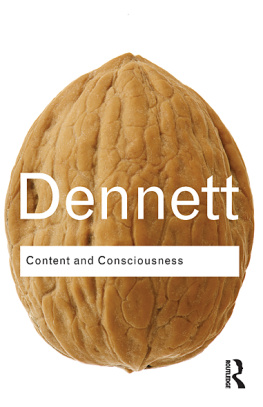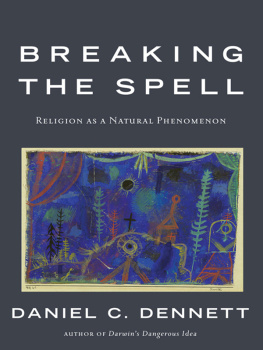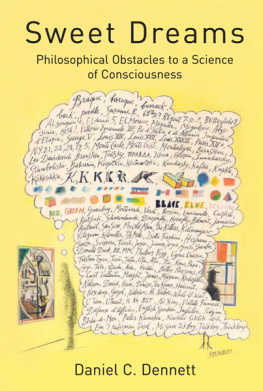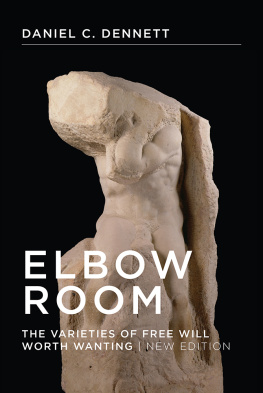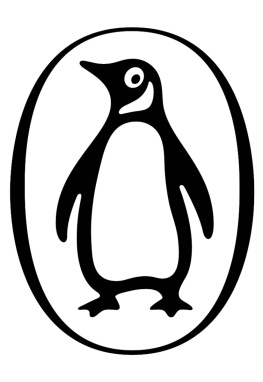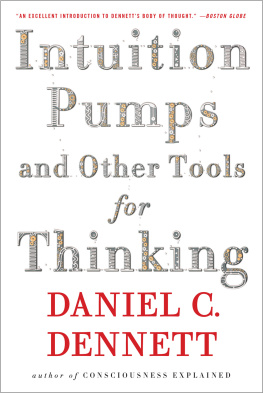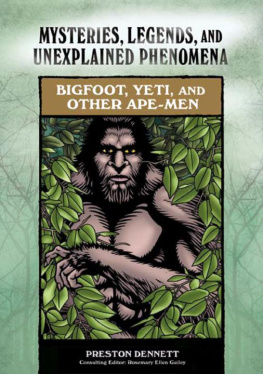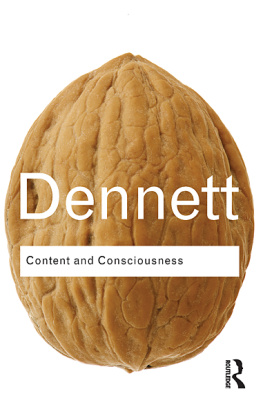Dennett - Content and consciousness
Here you can read online Dennett - Content and consciousness full text of the book (entire story) in english for free. Download pdf and epub, get meaning, cover and reviews about this ebook. City: New York, year: 2010, publisher: Routledge;Taylor & Francis, genre: Religion. Description of the work, (preface) as well as reviews are available. Best literature library LitArk.com created for fans of good reading and offers a wide selection of genres:
Romance novel
Science fiction
Adventure
Detective
Science
History
Home and family
Prose
Art
Politics
Computer
Non-fiction
Religion
Business
Children
Humor
Choose a favorite category and find really read worthwhile books. Enjoy immersion in the world of imagination, feel the emotions of the characters or learn something new for yourself, make an fascinating discovery.
- Book:Content and consciousness
- Author:
- Publisher:Routledge;Taylor & Francis
- Genre:
- Year:2010
- City:New York
- Rating:5 / 5
- Favourites:Add to favourites
- Your mark:
- 100
- 1
- 2
- 3
- 4
- 5
Content and consciousness: summary, description and annotation
We offer to read an annotation, description, summary or preface (depends on what the author of the book "Content and consciousness" wrote himself). If you haven't found the necessary information about the book — write in the comments, we will try to find it.
Content and consciousness — read online for free the complete book (whole text) full work
Below is the text of the book, divided by pages. System saving the place of the last page read, allows you to conveniently read the book "Content and consciousness" online for free, without having to search again every time where you left off. Put a bookmark, and you can go to the page where you finished reading at any time.
Font size:
Interval:
Bookmark:

Content and Consciousness
It presents a compelling and sometimes profound conception of the subject; it is ambitious without being grandiose; it employs scientific information effectively and ingeniously; its style, moreover, is enviably witty, clear, fluent and relaxed. One rarely encounters a difficult work of technical philosophy that is such a pleasure to read.
Thomas Nagel, Journal of Philosophy
Content and Consciousnessis an extraordinarily interesting and original book, and one which will raise the level of current discussion in the philosophy of mind.
Richard Rorty, Philosophical Studies
I have certainly been greatly stimulated by reading the book, and I recommend it to all others who have an interest in the problems of mind and body and of physicalism and its alternatives.
J.C.C. Smart, Mind
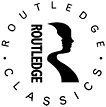
Routledge Classics contains the very best of Routledge Publishing over the past century or so, books that have, by popular consent, become established as classics in their field. Drawing on a fantastic heritage of innovative writing published by Routledge and its associated imprints, this series makes available in attractive, affordable form some of the most important works of modern times.
For a complete list of titles visit
ww.routledge.com/classics
Daniel C. Dennett
Content and Consciousness
With a new preface by the author

London and New York
First published 1969
by Routledge & Kegan Paul
Second edition published by Routledge 1986
First published in Routledge Classics 2010
by Routledge
2 Park Square, Milton Park, Abingdon, Oxon OX14 4RN
Simultaneously published in the USA and Canada
by Routledge
270 Madison Avenue, New York, NY 10016
Routledge is an imprint of the Taylor & Francis Group, an informa business
This edition published in the Taylor & Francis e-Library, 2010.
To purchase your own copy of this or any of Taylor & Francis or Routledges collection of thousands of eBooks please go to www.eBookstore.tandf.co.uk.
1969, 1986, 2010 Daniel C. Dennett
All rights reserved. No part of this book may be reprinted
or reproduced or utilised in any form or by any electronic,
mechanical, or other means, now known or hereafter
invented, including photocopying and recording, or in
any information storage or retrieval system, without
permission in writing from the publishers.
British Library Cataloguing in Publication Data
A catalogue record for this book is available from the British Library
Library of Congress Cataloging in Publication Data
A catalog record for this book has been requested
ISBN 0-203-09295-3 Master e-book ISBN
ISBN 10: 0415567866 (pbk)
ISBN 10: 0203092953 (ebk)
ISBN 13: 9780415567862 (pbk)
ISBN 13: 9780203092958 (ebk)
For
Susan
It has been a quarter century since I wrote the foreword to the first paperback edition. The cognitive science movement was well underway in 1984 and it is now going stronger than ever, with more and more philosophers playing the sorts of roles in it that I applauded then. Perhaps not so surprising is that in the interim something of a backlash has set in among a small coterie of philosophers who practise resolutely old-fashioned aprioristic philosophy of mind. I have yet to encounter anything worth more than a moments reflection in that literature, but I grant that it is logically possible that something will emerge from it that other researchers on the mind will find worth their attention. I am not holding my breath.
Rereading my book, I have learned something curious about how my own thinking has changed. There are some passages that I find I no longer wish to endorse strongly, but at the same time dont wish to recant. I have moved from conviction to bland agnosticism, and find that I dont even have much to say about why my allegiance has waned. For this very reason, there would be little or no point in my listing these passages; it would be of biographical interest at best and I dont wish to handicap them. So caveat lector; some of these passages may be best ignored or they may well be on to something important, may, for all I know, be gems I can no longer appreciate.
There is one set of ideas, however, mainly concentrated in philosophers. But the reason I didnt think I had to do this was that I thought I had sufficiently made the case in this book. I still think so.
Daniel Dennett
Cold Spring Harbor
June 1, 2009
It is now just twenty years since the first draft of this book was submitted (as a D. Phil. thesis at Oxford), and sixteen years since it was first published. In the intervening period the field of philosophy of mind has grown and changed enormously, a development that is perhaps made easier to see and appreciate by a reconsideration of the way the problems looked (to me) in the late 1960s.
When I was working on the book, its resolute naturalism and earnest concern with what science could tell us about the mind struck me as quite pioneering or quite eccentric, depending on my mood. Philosophers of mind made something of a fetish of their distance from any empirical investigations, except of the most informal linguistic sort. Times have changed. Now we have cognitive science. There are now more than a few philosophers of mind who are vastly more knowledgeable about the brain than I was then (or am now). A fairly professional knowledge of the other cognitive sciences psychology, artificial intelligence, linguistics is now considered a virtual qualification for professional status in the discipline.
So what strikes me now about my book is not its pioneering stand, for we are almost all naturalists today, but its intermittent naivet. This is mildly embarrassing, but not nearly so embarrassing as would be the discovery that I hadnt managed to achieve any advance in outlook over the years. There are also the unalloyed errors, of course, and these are indeed embarrassing. In fact, the only alterations to the text I have made, save for some typographical errors, are the elimination of a few preposterous howlers. (A good measure of what has been changed is the correction in example (4) in the : it was Ponce de Leon, not Hernando de Soto, who searched for the Fountain of Youth!) The more substantive errors, some of which I have still not recognized or recanted, alas, are left intact.
The task I set myself in the original Preface was to determine the constraints within which any satisfactory theory [of the mind] must evolve, and judging by the subsequent short span of theory evolution, I give myself high marks, at least for identifying the crucial issues and often even getting the matter right. For instance a voluminous debate on the identity theory has come and gone in the intervening years, leaving us with a residue of a few token-token identities and a good deal of eliminative materialism, with the slack taken up by various sophisticated versions of supervenience and accounts of psychology as an irreducible special science which is nonetheless properly deemed materialistic. In short, we are left with just about exactly the position I maintained (plus some useful sophistications) in .
Font size:
Interval:
Bookmark:
Similar books «Content and consciousness»
Look at similar books to Content and consciousness. We have selected literature similar in name and meaning in the hope of providing readers with more options to find new, interesting, not yet read works.
Discussion, reviews of the book Content and consciousness and just readers' own opinions. Leave your comments, write what you think about the work, its meaning or the main characters. Specify what exactly you liked and what you didn't like, and why you think so.

